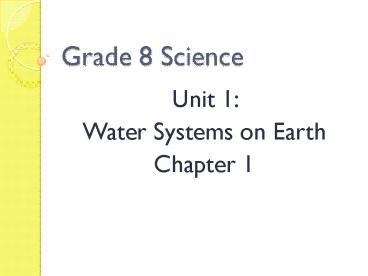Grade 8 Science - PowerPoint PPT Presentation
1 / 45
Title:
Grade 8 Science
Description:
Drainage Basins PowerPoint Presentation Canadian Drainage Basins PowerPoint Presentation 6 Major Drainage Basins in NL PowerPoint Presentation One Component Affects ... – PowerPoint PPT presentation
Number of Views:73
Avg rating:3.0/5.0
Title: Grade 8 Science
1
Grade 8 Science
- Unit 1
- Water Systems on Earth
- Chapter 1
2
Effects of Water?
Churchill River
3
Large Ocean Wave
4
How do you use water?
5
Water Distribution
6
- Only 3 of the Earths water is fresh water (no
salt). - 2/3 of this water is frozen in ice sheets.
- Therefore only 1 of the fresh water on Earth is
available.
7
Review of Terms...
- Lithosphere the solid rocky ground of the
Earths crust.
8
- Atmosphere the environment surrounding the Earth.
9
- Hydrosphere All water on Earth. Including that
in the lithosphere and atmosphere.
10
Why do we not run out of water?
11
The Water Cycle...
12
- The constant cycling of water through the
processes of evaporation and condensation - Water is constantly changing form
- (gas liquid)
- Driven by the suns energy
13
Scientists who study water...
- Hydrologist A person who studies Earths water
systems and helps to find solutions to problems
of water quality and quantity.
14
- 2. Oceanographer A person who studies all
aspects of the ocean. They are concerned with
the biology, geology, physics, and mathematics of
the ocean.
15
Ocean Water vs. Fresh Water
- Three ways in which fresh water differs from
ocean water are - Salinity
- Density
- Freezing point
16
1. Salinity
- The amount of salt dissolved in a specific amount
of water.
salt comes from dissolved solids in the ground
and volcanoes.
17
- Fresh Water
- tiny amounts of salt.
- Salt Water
- Average is 35 ppt.
- Varies depending on location.
- at the equator and poles
18
2. Density
- The amount of mass of a substance in a certain
unit volume. - How tightly packed together the material is in a
substance.
19
- Ocean water is more dense than fresh water due to
the salt content.
The Dead Sea
20
3. Freezing Point
- The temperature at which a liquid freezes.
- Fresh water... 0oC
- Salt water... -1.9oC
21
Core Lab Activities
- Activity 1-3A
- Salinitys Effect on Water Density
- Activity 1-3B
- Temperature Water Density
22
Sources of Fresh Water
- Lakes, ponds and wetlands
- Streams and rivers
- Ground water
- Glaciers
- Drainage basins
23
Ground water...
- Precipitation that falls on land and sinks out of
sight. - Sinks through pores in rocks until it reaches
bedrock where it pools. - Drilling to these pools make wells.
24
Ground Water
25
- Runoff does not sink into the ground or
evaporate. It flows across the Earths surface. - Affected by ground material, amount of rain,
length of time it rains, slope of the land,
vegetation, and the amount of development.
26
Glaciers...
- A moving mass of snow and ice.
- Found in areas where it is so cold the snow
remains all year.
27
Glaciers in mountains and on the continent of
Antarctica
28
- Glaciers slow down the passage of water through
the water cycle by storing vast quantities of
water. They release the water during the hot
summer months. - They give us information about the Earths past
climates.
29
Water trapped in glacial ice
30
The Ice Age
- The most recent began
- 120 000 years ago ending
- 11 000 years ago.
- Glaciers covered 20 of land on Earth.
31
(No Transcript)
32
Glaciers and Global Warming
- In the last 100 years the average surface temp.
Has increased by 0.5oC. - The worlds glaciers are melting at a quicker
paces than ever before.
33
Melting Greenland Glacier
34
Receding Athabasca Glacier in Alberta It has
receded 1.5 km since 1843.
35
(No Transcript)
36
What does this mean?
- Ocean waters may rise
- Flood rivers
- If they disappear, rivers may dry up
37
Drainage Basins
- Watershed
- The area of land that drains into a body of water
such as a river, pond, lake or ocean. - There may be many small within a larger basin.
38
- A divide separates one basin from another.
- Ex. The Continental Divide
39
Canadian Drainage Basins
40
(No Transcript)
41
6 Major Drainage Basins in NL
- Labrador Sea
- Gulf of St. Lawrence
- West Coast Gulf of St. Lawrence
- South Coast Gulf of St. Lawrence
- Atlantic Ocean Avalon Peninsula
- Atlantic Ocean North-east Coast
42
Using pencil leads, indicate the 6 major drainage
basins of NL
43
One Component Affects Another...
- Ex. Salinity affects the types of organisms that
can survive in an area. - Ex. Temperature affects the amount of dissolved
oxygen in water. The lower the temp. the more
oxygen.
44
- Ex. The convergence of the Labrador current and
the Gulf Stream influences productivity of the
Grand Banks, the movement of icebergs, and
migration of capelin and whales.
45
Debate Topics...
Problems/ issues related to the oceans include
- Seal hunt
- Cod moratorium
- Regional food fishery
- Oil and gas exploration































